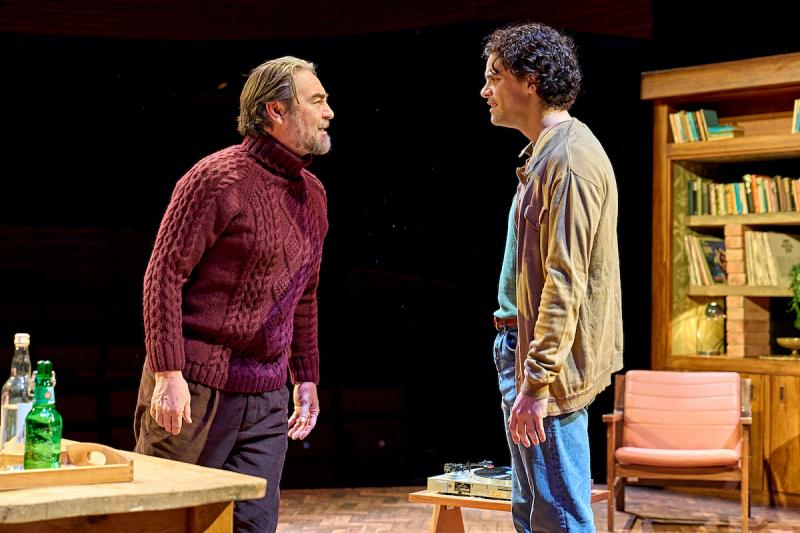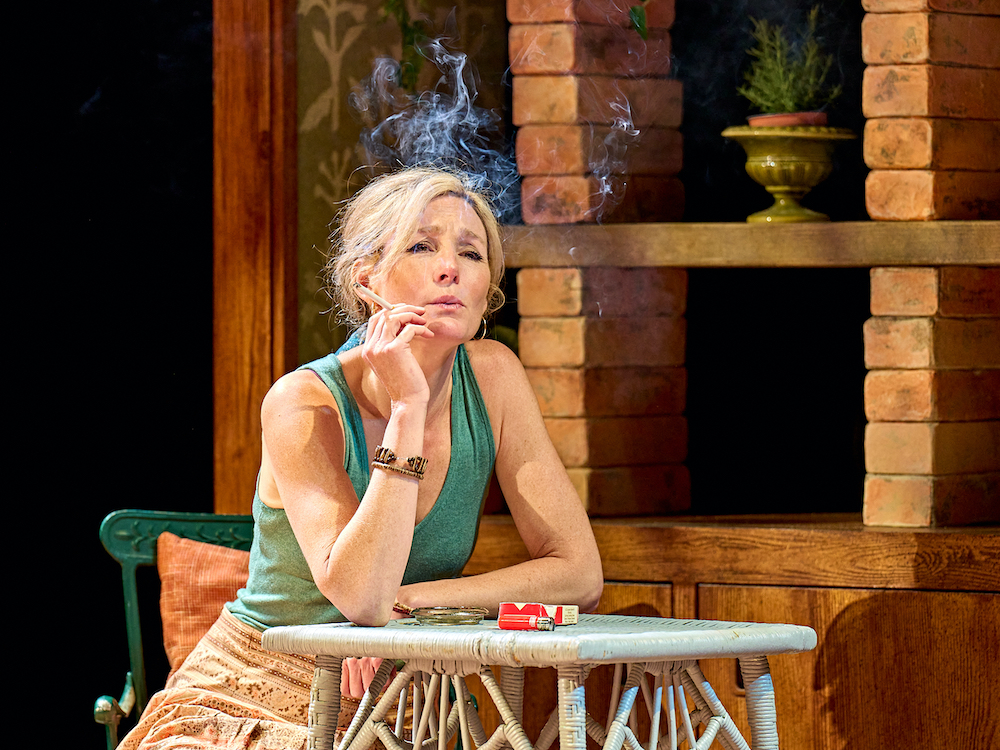Rock 'N' Roll, Hampstead Theatre review - exciting music, uneven staging | reviews, news & interviews
Rock 'N' Roll, Hampstead Theatre review - exciting music, uneven staging
Rock 'N' Roll, Hampstead Theatre review - exciting music, uneven staging
Nina Raine’s revival of Tom Stoppard’s 2006 epic rocks, but also stumbles

There is a song by Syd Barrett, founder member of Pink Floyd, called “Golden Hair”. It’s on his album The Madcap Laughs, released in 1970, a couple of years after he left the band, and every time I hear it I feel like I’m falling in love again. It also features in Tom Stoppard’s 2006 epic, the aptly named Rock ’N’ Roll, now revived at the Hampstead Theatre by playwright and director Nina Raine.
The figure of Barrett – an antic madcap whose use of LSD both inspired his psychedelic music and destroyed his mind – runs, skips and somersaults through the play, which spans European Cold War history over some 20 years between 1968 and 1990.
The play opens in Cambridge, at the home of Max, a Marxist who continues to support the Soviet Union despite Stalin and the crushing of the Hungarian revolution of 1956, and his wife, classics professor Eleanor. As Eleanor teaches the poetry of Sappho, she is also fighting cancer. The main story concerns Max’s relationship with Jan, a philosophy student from Czechoslovakia. Galvanised by news of the Prague Spring and Soviet invasion of his homeland, Jan is about to return, and argues with Max, who thinks that the communist states should follow the Moscow line. Before he goes, Jan catches a glimpse of 16-year-old Esme, the daughter of the house, a flower child entranced by Syd Barrett’s resemblance to the Great God Pan. In Prague, Jan finds himself in the middle of the dilemma of the reformists: how much can you protest against a dictatorial regime before you end up in jail? As he refuses to sign various petitions, preferring instead to listen to rock music albums – lots of fab riffs from the Rolling Stones, Beach Boys, Velvet Underground, Fugs and so on – he is gradually drawn into the ambit of the Plastic People of the Universe. He sees in this local Czech rock band an attitude of defiance which involves a withdrawal from public politics into a more subjective realm. A place where the most radical thing to do is to pursue your own sense of pleasure.
In Prague, Jan finds himself in the middle of the dilemma of the reformists: how much can you protest against a dictatorial regime before you end up in jail? As he refuses to sign various petitions, preferring instead to listen to rock music albums – lots of fab riffs from the Rolling Stones, Beach Boys, Velvet Underground, Fugs and so on – he is gradually drawn into the ambit of the Plastic People of the Universe. He sees in this local Czech rock band an attitude of defiance which involves a withdrawal from public politics into a more subjective realm. A place where the most radical thing to do is to pursue your own sense of pleasure.
While things turn out difficult for both Jan and the Plastics, the second half of the play returns to Cambridge. It is summer 1987, and, to Max’s chagrin, Mikhail Gorbachev is leading the Soviet Union along the road of perestroika. As Max’s health deteriorates, his daughter Esme, and student granddaughter Alice, hold a lunch party which brings most of the story’s characters – including Esme’s estranged husband Nigel and the Czech intellectual Lenka – together again. During more discussion of Marxist politics, tabloid journalism (a vulgarly populist article about Barrett has been written by one of the other guests), and the state of the nation, Jan also appears. It turns out that he loves not only English rock music, but one English woman too.
Stoppard’s play is baggy and full of talk, not only about whether communist regimes can be reformed or just passively resisted, but also about Sappho and love. If sexual desire is a thing of both mind and body, as Eleanor argues, then so is disease, which affects your mental state as well as your physical condition. In this human complexity surely Max’s materialism, however well expressed, is an inadequate theory. At the same time, Jan’s immersion in rock music feeds, at one and the same time, his desire for glorious transcendence and his social isolation. Amid some great word play and comedy complex issues about the nature of consciousness and the truth of personal betrayal wave at us from a parade of history that is intensely compelling.
Stoppard is a very literary playwright – just look at his 1966 debut Rosencrantz and Guildenstern Are Dead or his 1993 masterpiece Arcadia – and a note in his playtext for Rock ’N’ Roll explains how Barrett’s “Golden Hair” is based on a poem by James Joyce – who of course featured in Stoppard’s 1974 play Travesties. Ever punctilious, Stoppard includes the detail that Barrett added a line to Joyce’s original and thanks the Irish writer’s estate for their forbearance. But although such cerebral literary material is typical of this playwright, in this family drama there is also a strong emotional pull, partly deriving from the fact that since Stoppard was himself born in pre-war Czechoslovakia, his Jan character is a kind of invented parallel autobiography.
The central theme of personal freedom, which often looks different depending on which system you live under, remains strong although the play does have greater resonance for the over 60s than the under 30s. There is a clear contrast here between the East’s dictatorship, where young people who don’t want to conform are forced to choose between martyr-like dissidence and hedonistic pleasure, and the West’s democracy of obedience, of repressive tolerance, in which civil liberties have drained away, and where a culture of celebrity gossip and rampant consumerism trumps reform. Stoppard offers the Charter 77 movement as one Czech solution, and suggests that pop culture can bring East and West together in a dream of pleasure.
This is all well and good, but Raine’s rather disappointing production seems to have put so much energy into creating a traverse staging – similar to that of her big success Tiger Country – that not enough work has been done either on the individual acting or the ensemble. The lunch in Act Two is notably slack and unfocused, signifying a weak directorial grip unable to cover the problems caused by Stoppard’s occasionally erratic storytelling and lack of clarity: in the end, who has betrayed who? The final showdown between Max and Jan remains unclear. On the plus side, Raine’s smash cuts between each scene, which feature loud rock music and bacchanalia freak dancing, are thoroughly thrilling, a great reminder of the cultural and personal power of rock to redefine our sense of joy.
As for the acting, Nathaniel Parker holds the play together with his mixture of opinionated anger and occasional moments of softer emotion. As both Eleanor and Esme, Nancy Carroll (pictured above) does not really – in my eyes – distinguish sharply enough between mother and daughter, which gives her performance a sameness over the 2 hours and 45 minutes of running time. Jacob Fortune-Lloyd lends Jan a nice hangdog expression, but lacks charism and vitality. In the smaller roles, I like Colin Tierney, who plays Milan and other Czechs, and Hasan Dixon as Ferdinand, Jan’s Prague friend. Brenock O’Connor’s Piper at the Gates of Dawn adds a touch of addled hippiedom. Still, the play still fascinates: come on oldies, let’s rock again!
rating
Share this article
The future of Arts Journalism
You can stop theartsdesk.com closing!
We urgently need financing to survive. Our fundraising drive has thus far raised £49,000 but we need to reach £100,000 or we will be forced to close. Please contribute here: https://gofund.me/c3f6033d
And if you can forward this information to anyone who might assist, we’d be grateful.

Subscribe to theartsdesk.com
Thank you for continuing to read our work on theartsdesk.com. For unlimited access to every article in its entirety, including our archive of more than 15,000 pieces, we're asking for £5 per month or £40 per year. We feel it's a very good deal, and hope you do too.
To take a subscription now simply click here.
And if you're looking for that extra gift for a friend or family member, why not treat them to a theartsdesk.com gift subscription?
more Theatre
 Hedda, Orange Tree Theatre review - a monument reimagined, perhaps even improved
Scandinavian masterpiece transplanted into a London reeling from the ravages of war
Hedda, Orange Tree Theatre review - a monument reimagined, perhaps even improved
Scandinavian masterpiece transplanted into a London reeling from the ravages of war
 The Assembled Parties, Hampstead review - a rarity, a well-made play delivered straight
Witty but poignant tribute to the strength of family ties as all around disintegrates
The Assembled Parties, Hampstead review - a rarity, a well-made play delivered straight
Witty but poignant tribute to the strength of family ties as all around disintegrates
 Mary Page Marlowe, Old Vic review - a starry portrait of a splintered life
Tracy Letts's Off Broadway play makes a shimmeringly powerful London debut
Mary Page Marlowe, Old Vic review - a starry portrait of a splintered life
Tracy Letts's Off Broadway play makes a shimmeringly powerful London debut
 Little Brother, Soho Theatre review - light, bright but emotionally true
This Verity Bargate Award-winning dramedy is entertaining as well as thought provoking
Little Brother, Soho Theatre review - light, bright but emotionally true
This Verity Bargate Award-winning dramedy is entertaining as well as thought provoking
 The Unbelievers, Royal Court Theatre - grimly compelling, powerfully performed
Nick Payne's new play is amongst his best
The Unbelievers, Royal Court Theatre - grimly compelling, powerfully performed
Nick Payne's new play is amongst his best
 The Maids, Donmar Warehouse review - vibrant cast lost in a spectacular-looking fever dream
Kip Williams revises Genet, with little gained in the update except eye-popping visuals
The Maids, Donmar Warehouse review - vibrant cast lost in a spectacular-looking fever dream
Kip Williams revises Genet, with little gained in the update except eye-popping visuals
 Ragdoll, Jermyn Street Theatre review - compelling and emotionally truthful
Katherine Moar returns with a Patty Hearst-inspired follow up to her debut hit 'Farm Hall'
Ragdoll, Jermyn Street Theatre review - compelling and emotionally truthful
Katherine Moar returns with a Patty Hearst-inspired follow up to her debut hit 'Farm Hall'
 Troilus and Cressida, Globe Theatre review - a 'problem play' with added problems
Raucous and carnivalesque, but also ugly and incomprehensible
Troilus and Cressida, Globe Theatre review - a 'problem play' with added problems
Raucous and carnivalesque, but also ugly and incomprehensible
 Clarkston, Trafalgar Theatre review - two lads on a road to nowhere
Netflix star, Joe Locke, is the selling point of a production that needs one
Clarkston, Trafalgar Theatre review - two lads on a road to nowhere
Netflix star, Joe Locke, is the selling point of a production that needs one
 Ghost Stories, Peacock Theatre review - spirited staging but short on scares
Impressive spectacle saves an ageing show in an unsuitable venue
Ghost Stories, Peacock Theatre review - spirited staging but short on scares
Impressive spectacle saves an ageing show in an unsuitable venue
 Hamlet, National Theatre review - turning tragedy to comedy is no joke
Hiran Abeyeskera’s childlike prince falls flat in a mixed production
Hamlet, National Theatre review - turning tragedy to comedy is no joke
Hiran Abeyeskera’s childlike prince falls flat in a mixed production
 Rohtko, Barbican review - postmodern meditation on fake and authentic art is less than the sum of its parts
Łukasz Twarkowski's production dazzles without illuminating
Rohtko, Barbican review - postmodern meditation on fake and authentic art is less than the sum of its parts
Łukasz Twarkowski's production dazzles without illuminating

Add comment